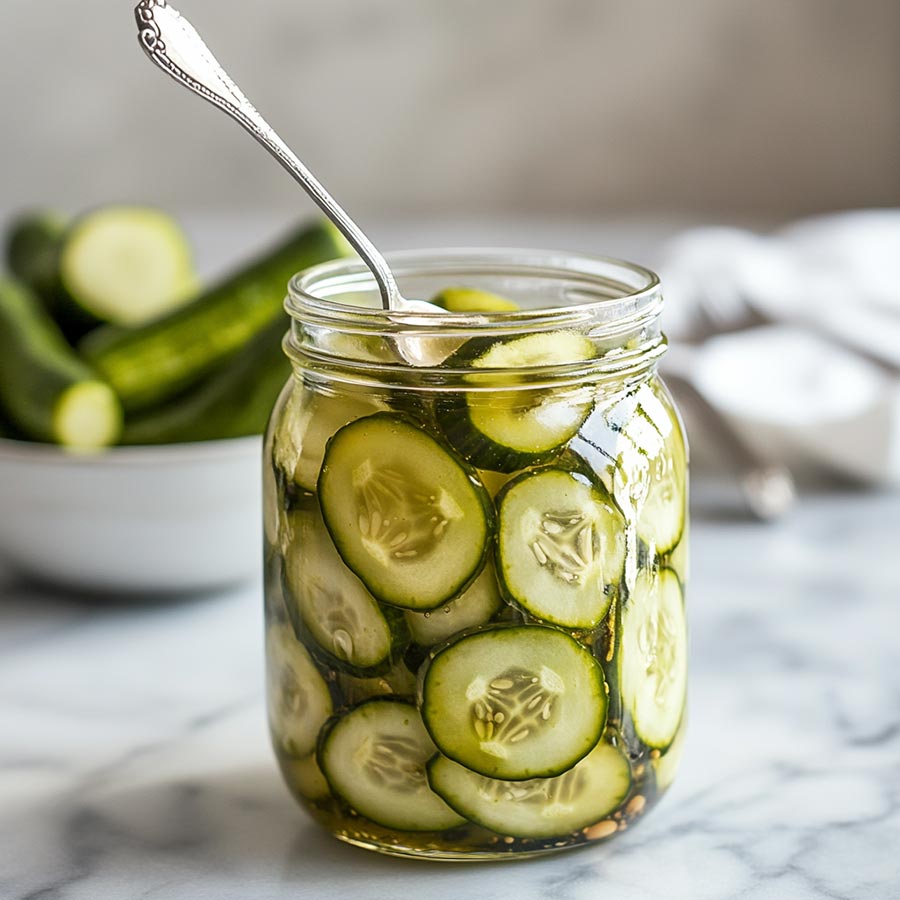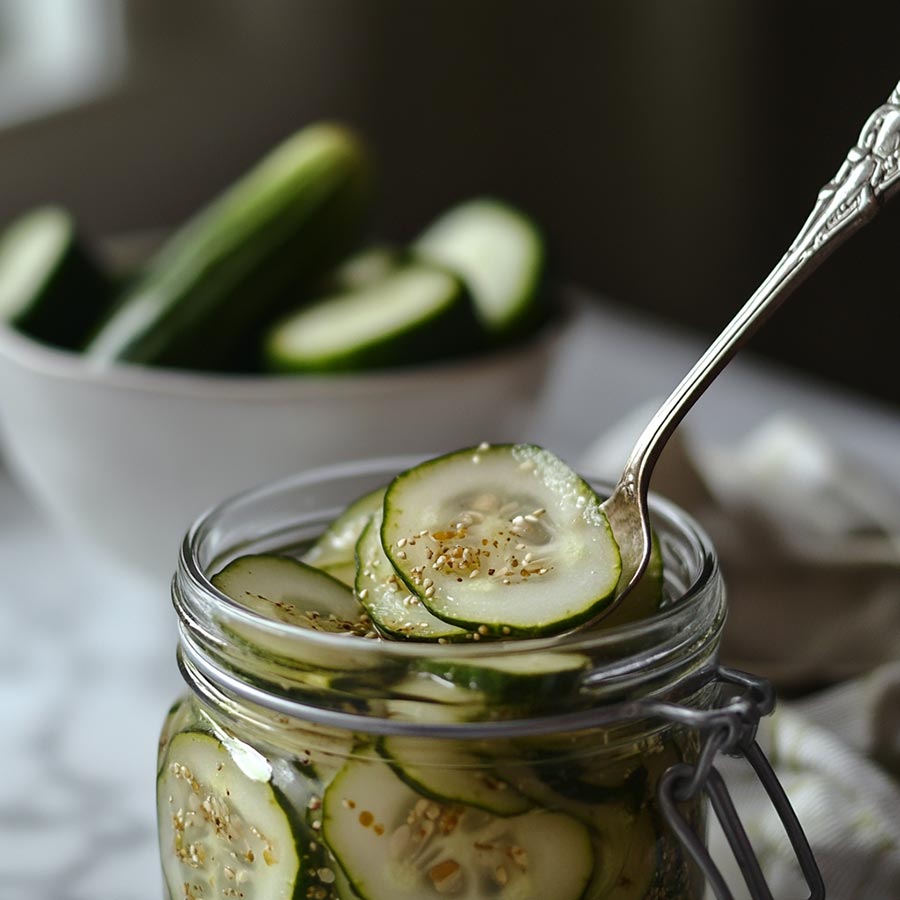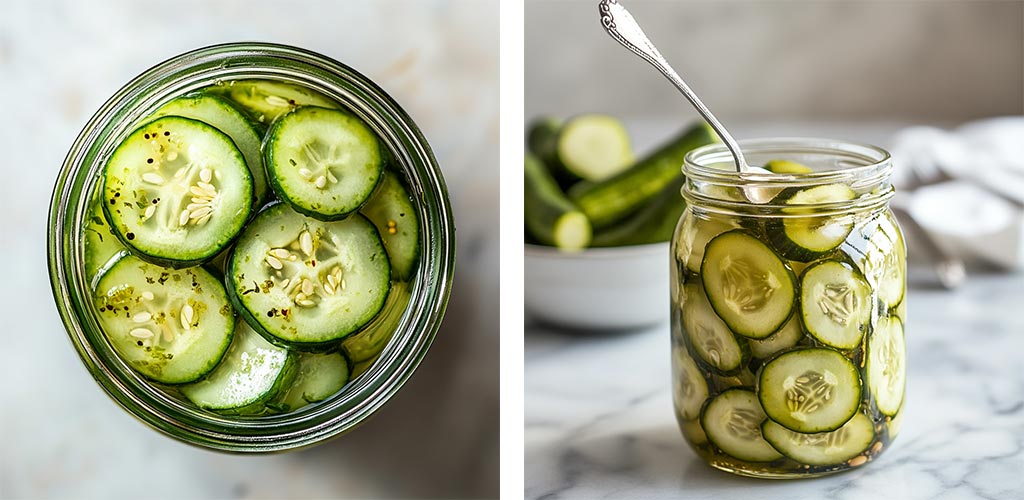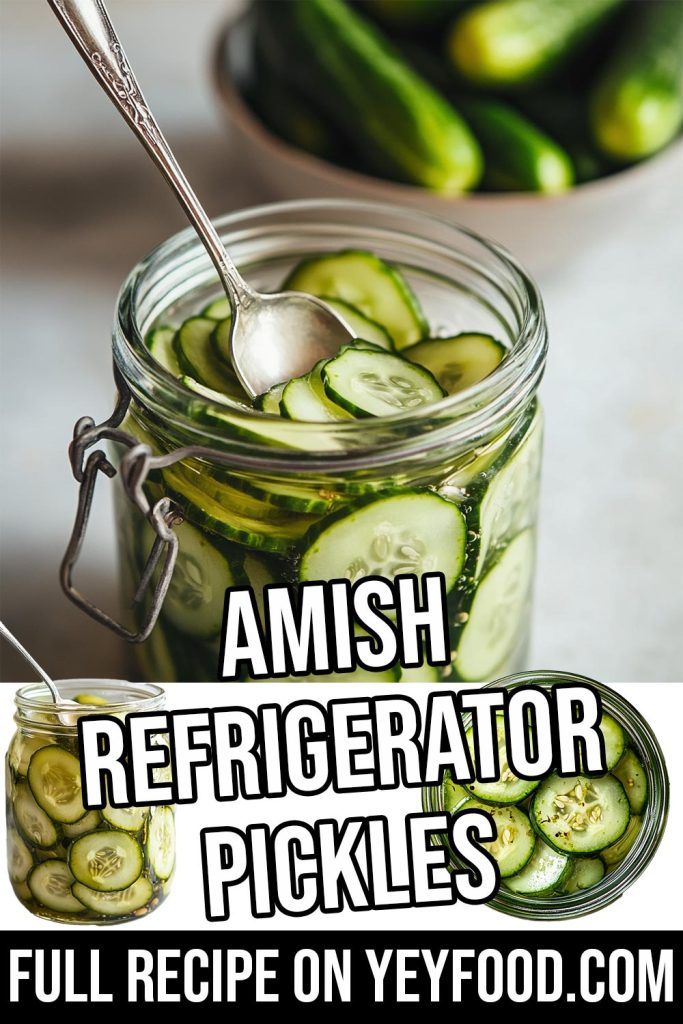Amish Refrigerator Pickles

If you’re looking for a delicious and easy way to preserve summer’s bounty, look no further than Amish refrigerator pickles. These crunchy, tangy pickles are a classic recipe that’s perfect for any occasion.
Amish refrigerator pickles are known for their simplicity. Unlike traditional canned pickles, they don’t require boiling or canning. Instead, the pickles are simply packed into jars with a brine made from vinegar, sugar, salt, and spices. This method allows the flavors to develop slowly over time, resulting in a pickle that’s both flavorful and shelf-stable.
To make Amish refrigerator pickles, you’ll need a few simple ingredients: cucumbers, onion, bell pepper, apple cider vinegar, sugar, salt, and celery seed. The vegetables are sliced and packed into sterilized jars, then covered with a brine. The jars are then sealed and refrigerated for at least 24 hours.
One of the best things about Amish refrigerator pickles is that they can be customized to your taste. For a spicier pickle, add a few red pepper flakes or a jalapeño pepper to the jars. If you prefer a sweeter pickle, increase the amount of sugar in the brine. Experiment with different combinations of vegetables and spices to find your perfect pickle.
Amish refrigerator pickles are a great way to preserve summer’s fresh produce. They’re also a delicious and versatile condiment that can be enjoyed with sandwiches, burgers, or charcuterie boards. So why not give this classic recipe a try? You won’t be disappointed.
Questions I often get asked about this recipe:

What is the difference between refrigerator pickles and canned pickles?
Refrigerator pickles are made by packing sliced vegetables into jars with a brine and refrigerating them. Canned pickles, on the other hand, are made by boiling the vegetables and brine and then canning them. Refrigerator pickles have a milder flavor and a shorter shelf life than canned pickles.
Can I use other vegetables besides cucumbers, onion, and bell pepper?
Yes, you can. Experiment with different combinations of vegetables, such as carrots, zucchini, or squash.
How long do Amish refrigerator pickles last?
Amish refrigerator pickles can last for several months when stored in the refrigerator. However, they will start to lose their flavor and become more acidic over time.
Can I freeze Amish refrigerator pickles?
It’s not recommended to freeze Amish refrigerator pickles. Freezing can cause the pickles to become mushy.
Can I make Amish refrigerator pickles without sugar?
Yes, you can. If you prefer a sweeter pickle, you can add sugar to the brine. However, the pickles will still be tangy without sugar.
What you need to make Amish Refrigerator Pickles:

4 large cucumbers, sliced
4 cups apple cider vinegar
2 cups granulated sugar
4 tablespoons kosher salt
2 tablespoons celery seed
How to make it:

Prepare jars: Sterilize 4 pint-sized mason jars.
Combine vegetables: Pack the sliced cucumbers into the prepared jars.
Make brine: In a large bowl, combine the apple cider vinegar, sugar, salt, and celery seed. Stir until the sugar and salt dissolve.
Pour brine: Pour the brine over the vegetables in the jars, filling them almost to the top.
Seal and refrigerate: Seal the jars tightly and refrigerate for at least 24 hours before serving. The pickles will improve in flavor over time.
Tips:

Use fresh, high-quality ingredients. Fresh vegetables will produce the best-tasting pickles. Avoid using cucumbers that are overripe or have soft spots.
Sterilize your jars. This will help prevent the pickles from spoiling. You can sterilize jars by boiling them for 10 minutes.
Be patient. Allow the pickles to sit in the refrigerator for at least 24 hours before eating them. The flavors will continue to develop over time.
Latest Reviews:

These Amish refrigerator pickles are a game-changer! The crunchy texture and tangy flavor are absolutely delicious. They’re perfect for adding a little zing to any dish. I’ve already made a second batch to have on hand. Lisa D.
I’ve been trying to find a good refrigerator pickle recipe for years, and I finally found it! These pickles are so easy to make and taste amazing. I love the simplicity of the ingredients and the fact that they don’t require any canning. Paul S.
I’ve tried a few different refrigerator pickle recipes, but this one is by far the best. The balance of sweet and sour is perfect, and the pickles are so crisp. I’ve already shared the recipe with all my friends and family. Sally T.
Printable Recipe:

Before you print the recipe, could I ask you a favor? Please consider sharing this recipe on Facebook or pin to a group on Pinterest? This would really help us out. Thank you so much <3

Amish Refrigerator Pickles
Amish Refrigeratir Pickles
Ingredients
- 4 large cucumbers, sliced
- 4 cups apple cider vinegar
- 2 cups granulated sugar
- 4 tablespoons kosher salt
- 2 tablespoons celery seed
Instructions
- Prepare jars: Sterilize 4 pint-sized mason jars.
- Combine vegetables: Pack the sliced cucumbers into the prepared jars.
- Make brine: In a large bowl, combine the apple cider vinegar, sugar, salt, and celery seed.
- Stir until the sugar and salt dissolve.
- Pour brine: Pour the brine over the vegetables in the jars, filling them almost to the top.
- Seal and refrigerate: Seal the jars tightly and refrigerate for at least 24 hours before serving. The pickles will improve in flavor over time.
If you enjoyed this recipe, please share it on your social media! I would love for more people to try this delicious and easy-to-make recipe. If you have any questions or feedback, please feel free to leave a comment below. I would love to hear from you! Shhh… Join our secret foodie group on Facebook
Pumpkin Streusel Cheesecake
No-Bake Pumpkin Fudge
Baked Pumpkin Crisp




